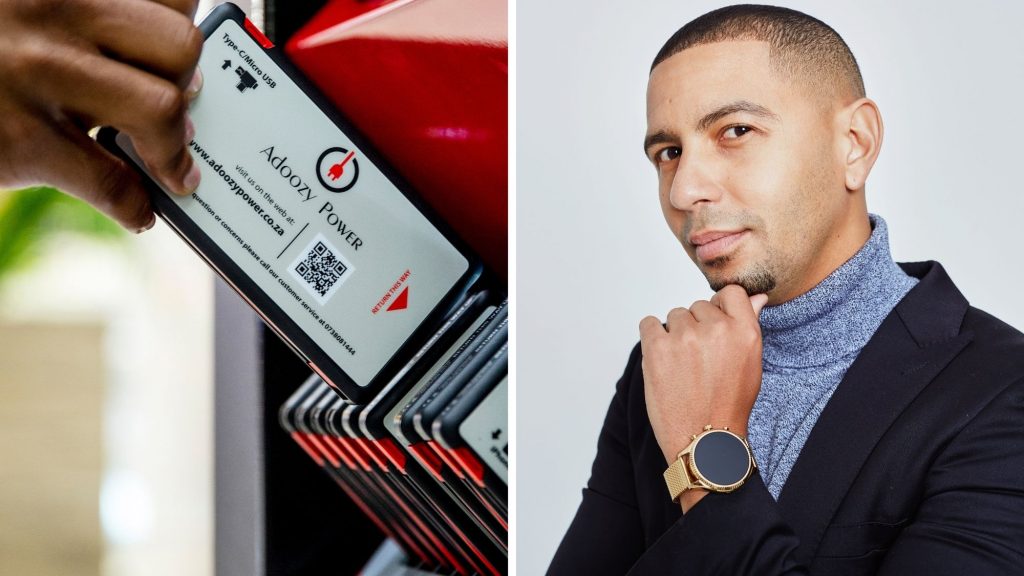We all have them. Those apps we open without thinking. Not because we need anything in particular, but because they feel… safe, in some…
Dead phone battery inspires power bank rental start-up

If successful entrepreneurship is about finding solutions to social problems, Kegan Peffer is on the fast lane to business success. That’s because he is the inspiration behind Adoozy, the first contactless power bank rental network in Africa, which enables consumers to rent power while on-the-go.
While the concept of rental exists in some parts of Europe and Asia, the modifications and applications have been tailored and elevated specifically for the African market and their unique needs.
How it works
Users download the Adoozy app and provide their sign-up information to register. From there, all it takes is a fingerprint scan and submission of card details, and the newly minted customer can make their way to an Adoozy Tower located in Johannesburg, Cape Town, and Durban. With a wave of their hand, their fingerprints are linked to their bank card.
This contactless biometric scanning, made possible by IDEMIA’s MorphoWave Compact Technology, is another first – other companies have yet to harness the power of biometrics to access a product.
This points to Peffer’s strength as an innovator – or, as he puts it, “a disruptor”. It was the panic he felt watching his own phone battery drain that moved him to come up with this solution.
“I realised that I cannot be the only person who has a real fear of being unable to access my phone,” he says – an astute observation, given how much our reliance on phones has increased during the pandemic.
Nowadays, a flat battery represents far more than the inconvenience of being without TikTok or Instagram – both considered musts in today’s socially networked culture. It can be truly disruptive if remote work or study is interrupted. More than that, a dead phone poses a safety risk. And, given energy regulator Eskom’s continuing tribulations, this is an increasing reality.
Adoozy founder an instinctual innovator

Looking at the country, and continents, specific pain points around power supply as well as global trends around phone use, it was clear to Peffer that this was a solution that could work.
His CV includes stints at the likes of Microvison and Bidvest Bank Terminals as a software developer. At the time, he says, even while working his nine-to-five, he had a deep-seated desire to do more – “and to do it for myself”.
In this way, the 38-year-old shows all the hallmarks of being a born entrepreneur: “I was always the kind of person who did a lot of things at once; always looking for innovation, for the next thing.”
That he did all this while building the backend of what is now Adoozy is testimony to his grit – but, then again, Peffer’s fascination with technology is such that it marks every interaction.
“Technology is one of my big loves; the other is people. This means I’m always working, even when I’m not – I like to be where people are, in restaurants and malls, at the heart of things. I like to be completely immersed in what’s happening, so it’s not unusual for me to walk up to someone and ask if they know the product, and if they do, where they’ve seen it.”
Peffer is a big believer in market research of this type – one of the reasons Adoozy can meet user needs so precisely is because he and his team invested many hours in testing and asking people which elements worked, and which didn’t.
Covid-19 pandemic pause
Much of this research took place during the pandemic. Keegan explains that although his team had been working on the concept for years, it’s only during the past two years that it had been marketed aggressively.
“When we believed the product was ready, the first thing we needed to consider was locations – after all, that’s a core component of ensuring the success of this undertaking. The pandemic made this more difficult because people weren’t going out during lockdown.”
So, yes, Covid slowed the company’s growth plans – but, on the other hand, it provided the space to test the product even more intensively and make sure it was the best it could be before its official launch to market.
Ironing out the kinks was an intensive process, but Peffer maintains that gaining insight is critical to the success of any start-up product or service; even more so in an industry related to cell phones.
“Because our devices have become an extension of ourselves, our business isn’t just about technology – it has a strong human and psychological element. You have to really get into the minds of their users, understand their mobile phone habits, their fears, and anxieties around our solution.”
As a self-described geek, this kind of legwork motivates Peffer. “I love technology and its power to transform how we live,” he enthuses.
An African solution to an African problem
Peffer’s conviction stems from the power issues affecting the entire continent. It’s not only South Africans who bemoan constant power cuts. Zimbabwe has been known to go without electricity for days at a time.
This points to the need for novel and innovative solutions from companies that understand the nuances of the African context, as well as the obstacles present.
Although the continent can be considered somewhat behind our global counterparts, we’ve seen great strides in the last five years with banking, cashless transacting, and other innovative solutions.
From a mobile tech perspective, there is still lots to be done, but Peffer believes that with our capacity to build, and uptake in investment in this space, power is the next frontier for the African continent.
“This is such an exciting industry to be part of – mobile technology in South Africa – and Africa as a whole – is just getting started!” Peffer says.
In terms of what’s next, Peffer says it’s all about expansion and diversification. We are working hard to create a real rental network across Africa at large, and we want to use this as a base to solve even more issues for our consumers,” he concludes.
ALSO READ: WiBox founders turn SA power cuts into start-up success

